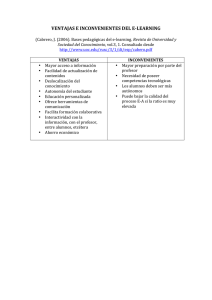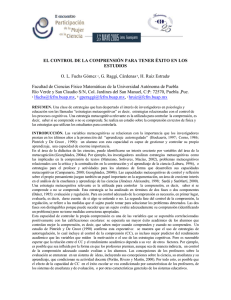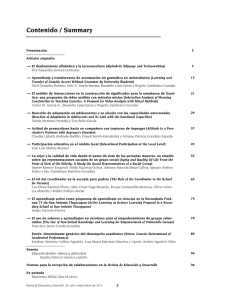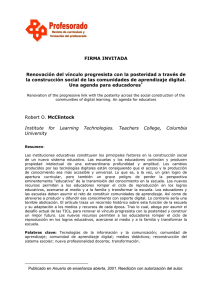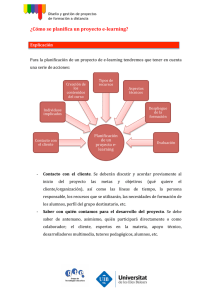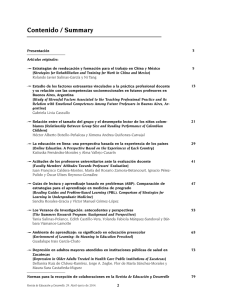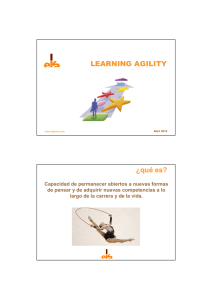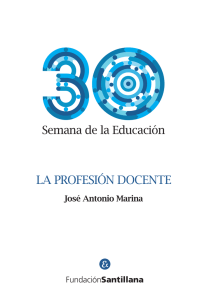REFERENCIAS BIBLIOGRÁFICAS Abad C. J. (Ed.). (1998
Anuncio
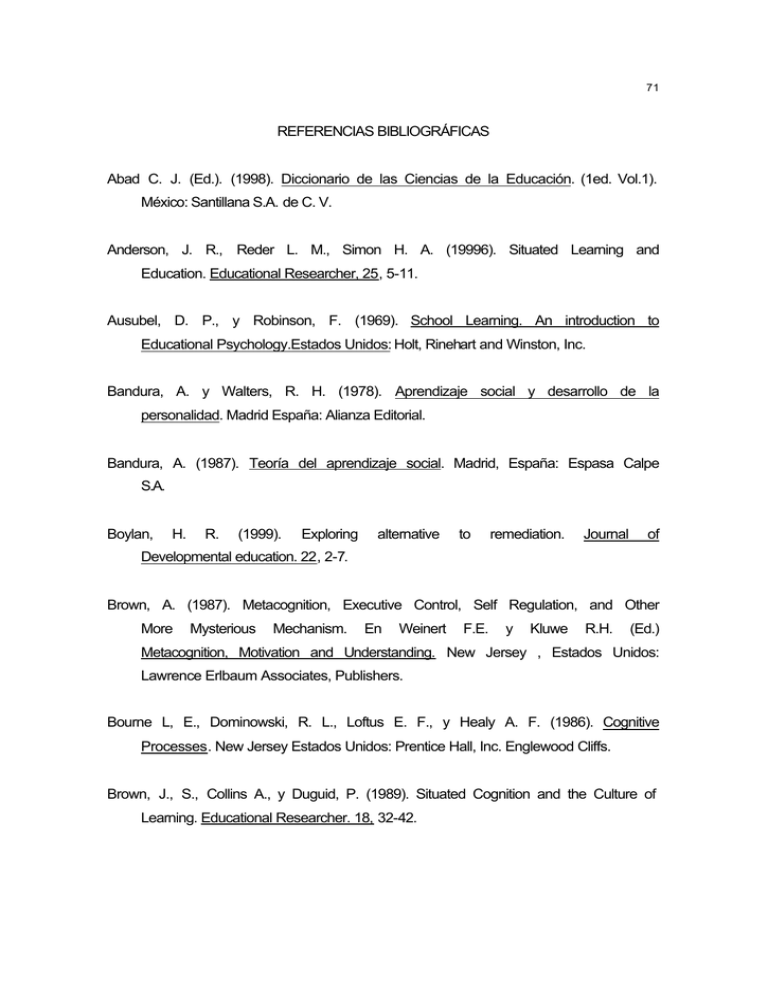
71 REFERENCIAS BIBLIOGRÁFICAS Abad C. J. (Ed.). (1998). Diccionario de las Ciencias de la Educación. (1ed. Vol.1). México: Santillana S.A. de C. V. Anderson, J. R., Reder L. M., Simon H. A. (19996). Situated Learning and Education. Educational Researcher, 25, 5-11. Ausubel, D. P., y Robinson, F. (1969). School Learning. An introduction to Educational Psychology.Estados Unidos: Holt, Rinehart and Winston, Inc. Bandura, A. y Walters, R. H. (1978). Aprendizaje social y desarrollo de la personalidad. Madrid España: Alianza Editorial. Bandura, A. (1987). Teoría del aprendizaje social. Madrid, España: Espasa Calpe S.A. Boylan, H. R. (1999). Exploring alternative to remediation. Journal of Developmental education. 22, 2-7. Brown, A. (1987). Metacognition, Executive Control, Self Regulation, and Other More Mysterious Mechanism. En Weinert F.E. y Kluwe R.H. (Ed.) Metacognition, Motivation and Understanding. New Jersey , Estados Unidos: Lawrence Erlbaum Associates, Publishers. Bourne L, E., Dominowski, R. L., Loftus E. F., y Healy A. F. (1986). Cognitive Processes. New Jersey Estados Unidos: Prentice Hall, Inc. Englewood Cliffs. Brown, J., S., Collins A., y Duguid, P. (1989). Situated Cognition and the Culture of Learning. Educational Researcher. 18, 32-42. 72 Bruffee, K. A. (1994). Making the most of knowledgeable peers. Change, 26 39-44. Catania, A. C. (1980). Operant Theory : Skinner . En G. M. Gazda, R. J. Corsini (Ed). Theories of Learning A Comparative Approach. Illinois, Estados Unidos: F.E. Peacock Publishers, Inc. Clark, T. E. (1991) The search for a new educational paradigm: the implications of New Assumptions about Thinking and learning. R. Miller (Ed.) New Directions in Education. Vermont, Estados Unidos: Holistic Education Press. Corno, L. (1989). Self Regulated Learning: A volitional analysis. En B. J. Zimmerman y D. H. Schunk, (Ed.) Self-Regulated Learning and Academic Achievement. Theory, Research and practice. Estados Unidos: SpringerVerlag. Corno, L., y Randi, J. (1999). A Design Theory for Classroom Instruction in SelfRegulated Learning? En C., Reigeluth (Ed.) En Instruccional Design, Theories and Models Vol II. USA: Edit. LEA. Chizhik, A. W. (1998). Collaborative learning through high-level verbal interaction: from theory to practice. Clearing House, 72, 58-61. Delors, J. (1996). Education for Tomorrow. UNESCO Courier, 49,6-14. Duffy, T. M., y Jonassen D. H. (1992). Constructivism: New Implications for instructional Technology . En T. M. Duffy y D. H. Jonassen (Ed). Constructivism and The Technology of Instruction a Conversation. New Jersey, Estado Unidos: Lawrence Erlbaum Associates, Inc., Publishers. Ertmer, P. A., Newby, T. J., MacDougall, M. (1995). Reflective Self Regulation as a Facilitative Factor in Learning form Case-Based Instruction. M. Simonson, M. 73 Anderson (Ed.). En Proceedings of Selected Research And development Presentations at the 1995 National Convention of the Association for Educational Communications and Technology Sponsored by the Research and Theory Division. Anaheim Ca. (Documento reproducido por ERIC no. ED383284). Flavell J. H. (1987). Speculations About the Nature and Development of Metacognition. En F.E. Weinert y Kluwe R.H. Metacognition, Motivation, and Understanding. New Jersey , Estados Unidos: Lawrence Erlbaum Associates, Publishers. Flavell J. H. (1992). Metacognition and Cognitive Monitoring : A New Area of Cognitive-Developmental Inquiry. En T.O. Nelson (Eds.). Metacognition Core Readings. Ma. Estados Unidos: Allyn and Bacon a División of Simon & Schuster, Inc. Foote E. (1998). Collaborative Learning in community colleges. Community College Journal of Research & Practice, 22, 173-177. Glennon-Salisbury, J. D., Gorrell, J., Sanders, S., Boyd, P., y Kamen M. (1999). Self Regulated Learning Strategies Used by the Learners in a LearnerCentered School. Documento American Educational presentado Research Association. en Annual Meeting of The Montreal, Quebec, Canadá. Abril 19-23 (documento reproducido por ERIC no. ED434944). Gray, T., y Halbert, S. (1998). Team Teach with a student. College Teaching, 46, 150- 154. Hammann, L. A., Stevens, R. J (1998). Metacognitive Assesment in Self-Regulated Learning and Performance Measures in an Introductory Educational Psychology Course. Documento presentado en Annual Meeting of the 74 American Educational Research Association. San Diego CA. Abril 13-17 (Documento reproducido por ERIC No. 424249). Harrington, J., y Oliver R. (1998). Using Situated learning and Multimedia To Promote Higher Order Thinking. Documento presentado en World Conference on Educational Multimedia and Hypermedia & World Conference on Educational Telecomunication. Freiburg, Alemania, Junio 20-25 (Documento reproducido por ERIC No. ED 428 672). Hefzallah, I. M. (1990). The New Learning and Telecomunications Technologies. Their potencial applications in education. Illinois, USA: Sprinfield. Jonassen, D.,H. Davidson, M., Collins, M., Campbell, J., y Bannan, B. H., (1995). Constructivism and Computer-Mediated Communication in Distance Education. The American of Distance Education, 9, 7-26. Kincannon, J., Gleber C., y Kim, J. (1999). The Effects of Metacognitive Training Performance and Use of Metacognitive Skills in Self-directed Learning Situations. K. Sparks, M. Simonson (Ed). En Proceedings of selected and Development papers presented at The National Convention of the Association for Educational Communications and Technology. Texas, Houston, Estados Unidos. Del 10 al 14 de febrero de 1999. (Documento reproducido por ERIC No. ED 436128). Lebow, D.G. (1995). Transforming Constructivist Classrooms Anderson (Ed.). En Presentations at into Values Learning and Emerging Enviroments. M. Technologies: Simonson, M. Proceedings of Selected Research and Development the 1995 National Convention of the Association for Educational Communications and Technology Sponsored by Research and Theory Division. Anaheim, California, reproducido por ERIC No. ED 383284). Estados Unidos. (Documento 75 Linn, M. C.(1986). The need for Science Curriculum Reform. En R.F. Dillon, y R.J. Stenberg (Ed.) Cognition and Instruction. Orlando Florida, Estados Unidos: Academic press, Inc. Mace F. C., Belfiore P. J., Shea M. C. (1989). Operant Theory and Research on self regulation. En B. Zimmerman y D. Schunk, (Ed.) Self-Regulated Learning and Academic Achievement. Theory, Research and practice. Estados Unidos: Springer-Verlag. Manning, B. (1991). Cognitive Self Instruction for Classroom Process. Nueva York, Estados Unidos: State University of New York. Marzano, R. J., Brandt, R. S., Hughes, C. S., Jones, B. F., Presseisen, B. Z., Rankin S. C., y Suhor, C., (1989). Metacognition. En Dimensión of Thinking a framework for curriculum and instruction. Virginia, USA: Association for Supervisión an Curriculum Development. Merriënboer van, J. J G. (1997). Training Complex Cognitive Skills. A Four component Instructional Design Model for Technical Training. Nueva Jersey, E. U.: Educational Technology publications, Inc. Englewood Cliffs. McCaslin, M. R. (1989) ) Self-Regulated Learning and Academic achievement: A Vygotskian view. En B. J. Zimmerman y D. H. Schunk, (Ed.) Self-Regulated Learning and Academic Achievement. Theory, Research and practice. Estados Unidos: Springer-Verlag McCombs, B. L. (1989) Self-Regulated Learning and Academic achievement: A phenomenological view. En B. Zimmerman y D. Schunk, (Ed.) Self-Regulated Learning and Academic Achievement. Estados Unidos: Springer-Verlag. Theory, Research and practice. 76 MacGregor, J., y Mathews R. S. (1994). The challenge of a colaborative Learning. Change, 26, 52-53. McLellan, H. (1996). “Being Digital” Implications for Education. Educational Technology, 36, 5-19. Miller, R. (1991) New Goals for Education. R. Miller (Ed.) New Directions in Education. Vermont, Estados Unidos: Holistic Education Press. Paris, S. G., y Byrnes, J. P. (1989). The Constructivist Approach to Self Regulation and Learning in the Classroom. En B. Zimmerman y D. Schunk, (Ed.) SelfRegulated Learning and Academic Achievement. Theory, Research and practice. Estados Unidos: Springer-Verlag Reinhard, L. W., Bruce R. H. (1992a). The Development and Evaluation of a SelfRegulaled Learning Inventory and Its Implication for Instructor-Independent Instruction. Documento presentado en Convention of The Association for Educational Communications and Technology and Sponsored by Research and Theory Division. Febrero 1992 (Documento reproducido por ERIC No. ED 348010). Reinhard, L. W. y Bruce R. H. (1992b). Self-Regulated Learning and Academic Achievement in College Students. Documento presentado en American Educational Research Association Annual Meeting. San Francisco. April 2024 (Documento reproducido por ERIC No. ED 345626). Reinhard, L. W., Bruce R. H., Wayne, I. G. (1996). The Design and Development of The Self–Regulatred Learning Inventory : A status report. Documento presentado en Annual Meeting of the American Educational Research 77 Association. Nueva York, Abril 8-12. (Documento reproducido por ERIC No. ED 401321). Reinhard, L. W., y Bruce R. H. (1998). Self-Regulated learning in Education Majors. The Journal of General Education, 47. 62-78. Rogers, C. (1986) .Libertad y Creatividad en la educación en la década de los ochenta. Barcelona, España: Ediciones Paidos. Rockwood, H. S. (1994). Learning that encourage discovery. College Teaching, 42, 166-1667. Rule, D. L y Griesemer, B. A. (1996). Relationships between Harter´s Scale of Intrinsic versus extrinsic Orientation and Bandura´s scale of Self Efficacy for Self Regulated Learning. Documento presentado en Annual Meeting of the Eastern Educational Research Association. Cambridge, MD. Febrero 24. (Documento reproducido por ERIC No. ED 409355). Russo, T. E. (1995). A collaborative learning / assesment model. Art Journal, 95, 82-83. Scardamalia, M. y Bereiter, C. (1986). Writing. En R.F. Dillon, y R.J. Stenberg (Eds.) Cognition and Instruction. Orlando Florida, Estados Unidos: Academic press, Inc. Short, E. y Weissberg-Benchell, J. (1989). The Triple Alliance for Learning: Cognition, Metacognition, and Motivation. En C. McCornick, E. Miller, y M. Pressley (Ed.) Cognitive Strategy Research. Nueva York, Estados Unidos: Springer-Verlag New York Inc. Schunk, D. H. (1989). Social Cognitive Theory and Self-Regulated Learning En B. Zimmerman y D.H. Schunk, (Ed.) Self-Regulated Learning and Academic 78 Achievement. Theory, Research and practice. Estados Unidos: SpringerVerlag. Schraw, G. Y Dennison, R. S. (1994). Assessing Metacognitive Awarness. Contemporary Educational Psychology, 19, 460-475. Schwartz, L. Y Gredler, M. (1997). The Effects of Goal Setting Instruction on Self – efficacy For The Self Regulated Learning (SESRL) in Undergraduate Classrooms. Documento presentado en Annual Meeting of the American Educational Research Association. Chicago Illinois. Marzo 24-28. (Documento reproducido por ERIC No. ED406953). Tinto, V., y Goodsell-Love, A. (1993). Building community. Liberal education, 79, 16-21. UDLA-P (2002a). Misión Institucional [Disponible en línea] http://www.udlap.mx/pg2/pres/mision.html UDLA-P (2002b). Estadísticas de alumnos inscritos en otoño. [Disponible en línea] http://omega.pue.udlap.mx:1443/escolar/0301Estad_Ins.html UDLA-P (2002c). Servicios Escolares- Búsqueda de horarios. [Disponible en línea] http://info.pue.udlap.mx:8080/escolar/jsp/horarios/index.jsp Vygostki, L. S. (1979). El Desarrollo de los procesos psicológicos superiores. Barcelona, España: Editorial Crítica. Vygostki, L. S. (1981). Thougth and Language. Traducido y editado por Eugenia Hanfmann y Gertrude Vakar (15ava edición). Cambridge Massachussets. The M.I.T. Press 79 Wayne, I. G., Reinhard W. L., Bruce R. H. (1996). A factor Analitic Study of The Self-Regulated Learning Inventory. Documento presentado en Annual Meeting of The American Educational Research Association. Nueva York, Abril 8-12. (Documento reproducido por ERIC No. ED402334). Weinert, F. E. (1987). Introduction and Overwiew: Metacognition and Motivation as determinantes of effective learning and understanding. En Weinert F. E. y Kluwe R.H. (Eds.) Metacognition, Motivation and Understanding. New Jersey , Estados Unidos: Lawrence Erlbaum Associates, Publishers. Wirth, G. A. (1992). Education and Work for the year 2000. Choices we face. San Francisco California: Josseey-Bass Publishers. Woolfolk A. E. (1990). Psicología Educativa. (3ra. Ed.). México: Prentice-Hall Hispanoamericana, S. A. Zimmerman, B. J., y Martínez Pons, M. (1986). Development of a Structured Interview for Assesing Student Use of Self-Regulated Learning Strategies. American Educational Research Journal, 23, 614-628. Zimmerman, B. J. (1989). Models of Self-Regulated Learning and academic Achievement. En B. Zimmerman y D. Schunk (Ed.) Self Regulated Learning and Academic Achievement. Michigan, Estados Unidos. Springer-Verlag. Zimmerman, B. J., y Martínez-Pons, M. (1992). Perceptions of Efficacy and Strategy Use in the Self-Regulation of Learning. En H. Schunk y J. L. Meece (Ed.) Student Perceptions in the Classroom. New Jersey, Estados Unidos: Lawrence Erlbaum Associates, Publishers. 80 Zimmerman, B. J., Bonner, S., Kovach R. (1996). Developing Self-Regulated Learners Beyond Achievement to Self Efficacy. Washington D.C. Estado Unidos: American Psychological Association. Zimmerman B.J. (1999) Comentary: toward a cyclically interactive vie of self regulated learning. International Journal of Educational Research, 3, 545-51.
